When it comes to establishing a digital presence, securing the right domain name is your online identity’s foundation. Whether you’re setting up a personal blog, launching an e-commerce site, or representing your business, understanding the cost of domain names is crucial.
In this comprehensive guide, we will delve into the factors influencing domain pricing. This will also include exploring registration and renewal costs, discussing premium domains, and providing tips for securing the perfect domain name for your needs.
1. Understanding Domain Names Pricing Factors
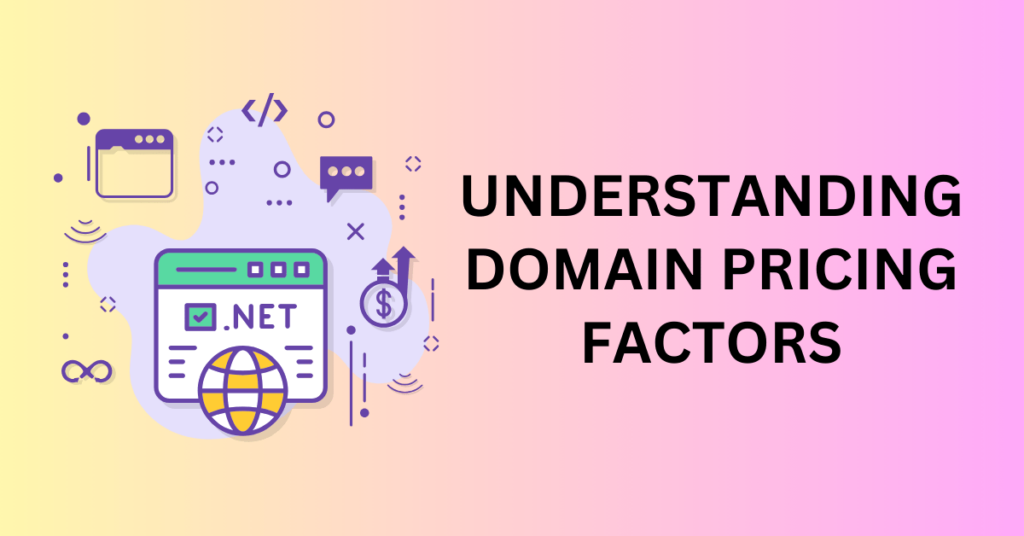
Before we dive into the cost breakdown, it’s essential to grasp the factors that influence domain pricing. Domain name prices are not arbitrary.
They are determined by several key variables:
Domain Extension (TLD): The extension of your domain, also known as the top-level domain (TLD), significantly affects its price. Common TLDs like .com, .net, and .org are generally more affordable than specialized or country-code TLDs like .app, .io, or .london.
Registrar: Domain registrars are companies authorized to sell domain names. Different registrars may offer varying prices for the same domain name, so it’s wise to shop around for the best deals. There might be different pricing models like the initial fee and the renewal fee across different registrars.
Domain Length: The length and complexity of your domain name can impact its cost. Short, memorable domain names are often pricier due to their desirability and market demand.
Keyword Popularity: If your domain name contains popular keywords or phrases, it may command a higher price. Therefore, keywords with commercial value can drive up domain costs.
Renewal Fees: While the initial registration cost is a one-time expense, renewal fees are recurring costs. Therefore, it’s vital to consider the long-term expenses associated with maintaining your domain name.
Get Your Affordable Domain Name
2. Domain Name Registration Costs
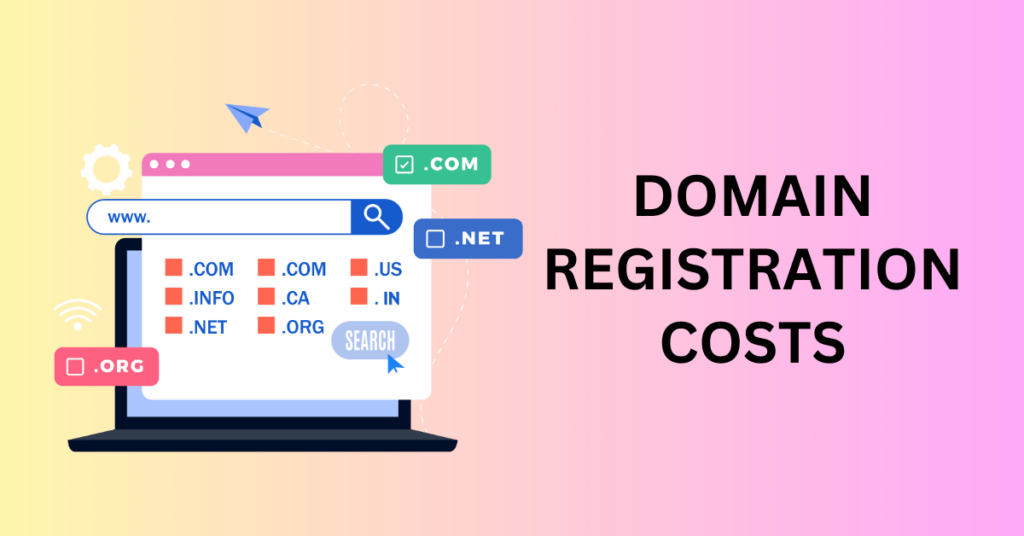
Domain registration is the initial step in acquiring a domain name. The cost of registering a domain name can vary widely depending on the factors mentioned earlier.
Here’s a breakdown of typical registration costs:
Standard TLDs: Common TLDs like .com, .net, and .org typically cost between $10 to $20 per year. Some registrars offer promotional rates for the first year, which may be considerably lower.
Specialized TLDs: Specialized or niche TLDs, such as .app, .io, or .blog, may have higher registration fees, ranging from $20 to $50 or more per year.
Premium Domains: Premium domains are highly sought-after, often short, keyword-rich domain names. Their prices can vary dramatically, ranging from hundreds to thousands or even millions of dollars.
Country-Code TLDs: Country-code TLDs like .uk (United Kingdom) or .ca (Canada) can have varying registration costs, depending on the specific registrar and policies of the country’s domain authority.
3. Domain Renewal Costs
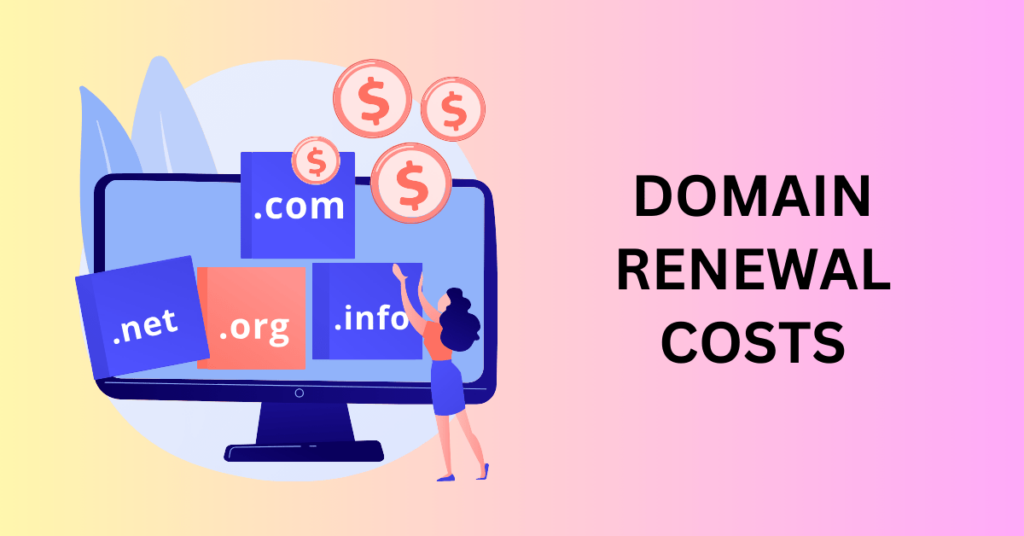
It’s important to remember that domain registration is an ongoing commitment. Also, the renewal costs must be factored into your budget. Renewal fees are typically similar to or slightly higher than the initial registration fees.
For example, if you register a .com domain for $15 for the first year, you can expect to pay a similar amount for renewals in subsequent years. This is because you have no choice but to extend it as your business relies on that.
However, it’s essential to be aware of renewal pricing policies. Some registrars may offer discounted rates for the first year and then increase the renewal fees. While others maintain consistent pricing throughout the domain’s lifetime, it’s crucial to understand your registrar’s renewal policies to avoid surprises.
Get Your Affordable Domain Name
4. Premium Domain Names Pricing
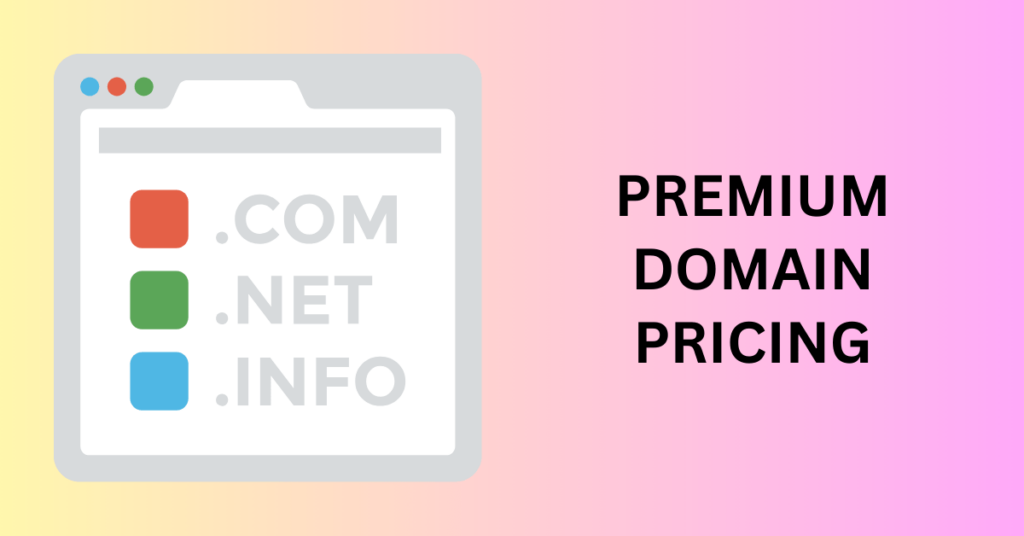
Premium domains are a unique category of domain names that come with a premium price tag. These domains are often short, memorable, and contain valuable keywords.
Their pricing is determined by various factors including:
Desirability: The more desirable and in-demand a premium domain is, the higher its price will be. Premium domains that align with popular industry keywords or trends tend to be more expensive.
Market Demand: Prices can also be influenced by market demand. If multiple buyers are interested in the same premium domain, it can lead to competitive bidding and increased prices.
Seller’s Valuation: The domain’s owner or seller plays a significant role in setting its price. Some sellers may value their domains higher than others, depending on factors like the domain’s history, age, and perceived worth.
Domain Length: Short, concise premium domains are generally pricier due to their scarcity and memorability.
Keyword Value: Premium domains that include high-value keywords can command premium prices, especially if those keywords have commercial significance.
Premium domain prices can range from hundreds to millions of dollars. It’s crucial to conduct thorough research and consider your budget when exploring premium domain options.
5. Tips for Securing an Affordable Domain

While domain names can vary in price, there are several strategies to help you secure an affordable domain name:
Choose Common TLDs: If budget is a concern, opt for standard TLDs like .com, .net, or .org, as they are often more affordable than specialized or niche TLDs.
Look for Promotions: Many registrars offer promotional rates for the first year of registration. Take advantage of these offers to secure your domain at a discounted rate.
Consider Alternative TLDs: If your desired domain name is unavailable or too costly with a .com extension, explore alternative TLDs that might be more affordable.
Negotiate for Premium Domains: If you’re interested in a premium domain, don’t hesitate to negotiate with the seller. Prices for premium domains are often negotiable, and you may be able to secure a better deal.
Register for Longer Periods: Some registrars offer discounts for multi-year registrations. Consider registering your domain for several years if it’s a long-term project to save on renewal costs.
Transfer to a Different Registrar: If you find lower renewal prices at another registrar, you can transfer your domain to take advantage of the better rates.
The cost of a domain name can vary widely based on factors like the domain extension, registrar, domain length, keyword popularity, and whether it’s a premium domain. Understanding these factors and factoring in registration and renewal costs is crucial when budgeting for your online presence.
By exploring affordable options, considering alternatives, and negotiating where possible, you can secure the perfect domain name without breaking the bank. Remember that your domain is your online identity, so choose wisely and invest in a name that aligns with your brand and goals.
Get Your Affordable Domain Name
How do I Pick a Domain Name?
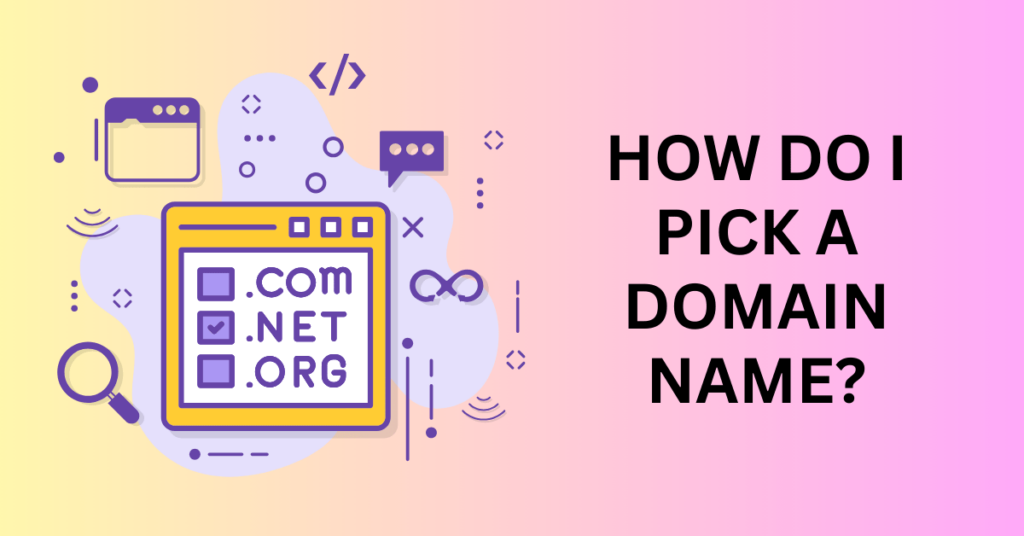
Selecting the perfect domain name is a critical step in establishing your online presence. Your domain name is your website’s identity, so it should be memorable, relevant, and reflective of your brand or purpose.
Here’s a step-by-step guide on how to pick a domain name:
1. Define Your Website’s Purpose – Domain Names
Start by clarifying the purpose and goals of your website. Are you creating a personal blog, launching an e-commerce store, setting up a portfolio, or representing a business? Understanding your website’s primary function will help you choose a domain name that aligns with its purpose.
2. Brainstorm Keywords – Domain Names
Identify relevant keywords or key phrases related to your website’s content or niche. These keywords can serve as the foundation for your domain name. Consider the primary topics, services, or products you’ll feature on your site.
3. Keep It Short and Simple – Domain Names
Short, concise domain names are easier to remember, type, and share. Aim for a domain name that’s no longer than two to three words. Avoid complex or lengthy names that might confuse visitors or be prone to typos.
4. Make It Memorable – Domain Names
A memorable domain name is more likely to stick in people’s minds. It should be unique and distinct, making it easier for visitors to recall and revisit your site. Avoid generic or generic-sounding names.
5. Avoid Special Characters and Numbers – Domain Names
Special characters (such as hyphens or underscores) and numbers can make a domain name more complicated and less memorable. They can also lead to confusion when sharing your domain verbally.
6. Check Domain Availability – Domain Names
Use a domain registrar’s search tool to check the availability of your chosen domain name. Keep in mind that popular or highly desirable domain names may already be taken. Be prepared to explore alternatives if your first choice is unavailable.
7. Choose the Right Domain Extension (TLD) – Domain Names
Select the domain extension, also known as the top-level domain (TLD), that best suits your website. Common TLDs like .com, .net, and .org are versatile and widely recognized. However, there are numerous specialized TLDs (.blog, .store, .tech, etc.) that can be a good fit if they align with your niche or brand.
8. Consider Branding – Domain Names
If your website represents a brand, try to incorporate the brand name into your domain. Consistent branding across your domain name and website content helps establish brand identity and trust.
9. Research Competitors – Domain Names
Investigate what domain names your competitors are using. While you should aim for uniqueness, understanding your competitors’ naming conventions can provide insights and inspiration.
10. Think Long-Term – Domain Names
Choose a domain name that will stand the test of time. Consider how it might evolve with your website’s growth and expansion. Avoid trends or overly specific names that may limit your site’s appeal in the future.
11. Check for Trademarks – Domain Names
Before finalizing your domain choice, research trademarks to ensure you’re not infringing on someone else’s intellectual property. Avoid using trademarked terms in your domain name to prevent legal issues.
12. Get Feedback – Domain Names
Once you’ve narrowed down your options, seek feedback from friends, family, or colleagues. They can provide valuable perspectives and help you choose the most effective domain name.
13. Register Your Domain – Domain Names
Once you’ve found the perfect domain name, register it through a reputable domain registrar. Be sure to keep track of your domain’s expiration date and renew it promptly to maintain ownership.
Get Your Affordable Domain Name
Do I Need More Than One Domain Name?

Whether you need more than one domain depends on your specific goals, business needs, and online strategy. Having multiple domains can serve various purposes, but it’s essential to consider whether they align with your objectives and resources.
Here are some scenarios in which you might consider having multiple domains:
1. Brand Protection
If you register example.net, example.org, and other popular TLDs. This will then prevent others from using similar domains to impersonate your brand.
2. Targeting Different Geographic Regions
If your business operates in multiple countries or regions, it can be beneficial to have country-code domains (ccTLDs) for each region. For instance, example.com could serve your global audience, while example.co.uk might be targeted at the United Kingdom. This can also help with localized marketing and search engine optimization (SEO).
3. Segmenting Products or Services
If your business offers a wide range of products or services, using separate domains for each category can provide clarity and focus. For example, if you have a furniture store, you might have one domain for sofas (e.g., sofas.com) and another for tables (e.g., tables.com).
4. Marketing Campaigns
Businesses often register specific domains for marketing campaigns or promotions. These campaign-specific domains can be easier to remember and track for specific advertising efforts. Once the campaign concludes, you can redirect the domain to your main website.
5. Keyword Optimization
Some websites use keyword-rich domains to improve search engine ranking for specific terms. These domains can also act as landing pages or microsites optimized for particular keywords. However, this strategy requires careful SEO planning and content development.
6. Niche Projects or Blogs
If you’re involved in multiple niche projects, it may make sense to have separate domains for each project. This allows you to build distinct brands and cater to different target audiences.
7. Expansion or Acquisitions
When expanding your business or acquiring other businesses, you may acquire additional domains associated with the new ventures. These domains can be used to create separate websites for each entity.
Get Your Affordable Domain Name
While multiple domains can offer advantages, they also come with management responsibilities and costs. You’ll need to renew and maintain each domain, develop content for each website, and potentially manage separate hosting accounts. Additionally, search engines may consider duplicate content issues if you have multiple domains with identical or very similar content.
Before deciding to acquire multiple domains, carefully assess your objectives and resources. Consider whether the benefits of having multiple domains outweigh the associated costs and management efforts. For many businesses and individuals, a single well-optimized domain can effectively serve their online presence and marketing needs.
Final Thoughts – Unveiling the Cost of Domain Names
In conclusion, picking the right domain name requires thoughtful consideration of your website’s purpose, keywords, length, memorability, and branding. Take your time to explore options, check availability, and ensure your chosen domain aligns with your long-term goals.
A well-chosen domain name can enhance your online presence and contribute to the success of your website or online project.





